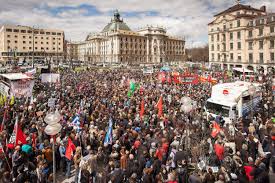记忆方法
将“demonstration”分解为“de”+“mon”+“strate”+“tion”。想象“de”像一个小精灵在舞台(theatre)上展示(strate),这种展示充满了“mon”(怪物)般的激情和活力,因此形成了“demonstration”这个词语,代表一个有影响力的展示或示威。
以上内容由AI生成, 仅供参考和借鉴
中文词源
demonstration 示范,游行示威
来自demonstrate, 展示,示范。用来指流行示威等。
英语词源
- demonstration (n.)
- late 14c., "proof that something is true," from Old French demonstration or directly from Latin demonstrationem (nominative demonstratio), noun of action from past participle stem of demonstrare "to point out, indicate, demonstrate," figuratively, "to prove, establish," from de- "entirely" (see de-) + monstrare "to point out, show," from monstrum "divine omen, wonder" (see monster). Meaning "public show of feeling," usually with a mass meeting and a procession, is from 1839. Related: Demonstrational.
权威例句
- 1. The demonstration itself was against the Government's new Community Charge.
- 游行本身反对的是政府新出台的“人头税”。
- 2. European farmers are planning a massive demonstration against farm subsidy cuts.
- 欧洲农场主正策划一场抗议削减农场补贴的大规模示威游行。
- 3. Rubber bullets were used to break up the demonstration.
- 橡皮子弹被用来驱散示威人群。
- 4. A planned demonstration has been called off by its organisers.
- 原定的游行示威已被组织者取消。
- 5. There's been no public demonstration of opposition to the President.
- 没有人对总统公开表示反对。
